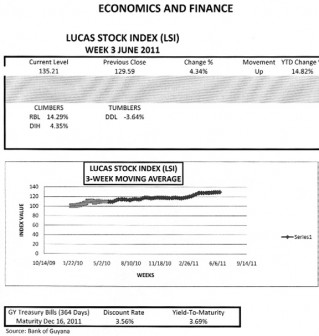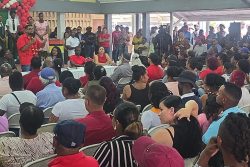Legal Jeopardy
One of the busiest market places in Guyana is the cambio, where foreign currency is bought and sold daily. Currencies that change hands now in open and legitimate trade were once the subject of shadowy activity and legal jeopardy. That changed when the PNC administration, now PNC/R, under the late President Desmond Hoyte, liberalized trade in foreign currency in 1989 and permitted the opening of the money houses that are known across Guyana as cambios. Despite the tight spaces and innocuous looking places in which some foreign currency transactions occur, today the cambios play a pivotal role in the proper and effective functioning of the Guyana economy.
Legacy
The service provided by the cambios is critical to trade and travel. Not only do they give safe and orderly access to foreign currency, they help stabilize the exchange rate by removing the hidden hand of the black market. The money that changes hands form part of the money supply. Given the durability of this market and its configuration of cambios, the introduction of the system for currency trade could be regarded as one of the more valuable legacies of the PNC/R government. That the current PPP/C administration kept this market structure in place is one important reason the Guyana economy was able to survive its trials and tribulations of the last 19 years. It is also testimony to the strategic value of the action of the PNC/R administration for which all Guyanese should be appreciative. The survival of the cambios is a thread that ties the PPP/C administration to the legacy of the PNC/R.
Sigh of Relief

Guyanese can breathe a sigh of relief that the current administration did not risk tampering with this market. In addition to bringing order to the trade in currency, the introduction of cambios made it easier for the Bank of Guyana to use monetary policy to control inflation and the value of the Guyana dollar vis-à-vis other currencies. The PPP/C so liked this legacy of the PNC/R administration that in 1997 it designated cambios the principal merchants of foreign currency transactions. This move meant that persons or businesses seeking foreign currency to settle international trade transactions or to meet travel needs could only obtain foreign currency from the cambios. As a sign of the faith placed by the current administration in the usefulness and value of the cambios, even the Bank of Guyana was told that it had to satisfy its own foreign currency needs through the cambios.
Risk
Now that Guyanese have grown accustomed to easily accessing foreign currency, there is a risk in believing that nothing could easily disrupt the operation of the foreign currency market and take away the convenient access to hard currency that traders and travelers enjoy today. But there is no guarantee that things will remain the same under a new administration, and Guyanese need to think carefully about what the candidates of the various political parties are saying about the economy. The expressed ambition of the presidential candidate of the PPP/C to pursue a policy of import substitution, if elected, could open a can of worms and unwittingly destabilize the foreign currency market.
Magnitude
It is easy to see and understand the magnitude of the problems Guyanese could face if the country pursues an economic policy, such as import substitution, that could potentially interfere with the operation of the foreign currency market. Import substitution often calls for suppressing the imports of some commodities through higher import duties, denial of access to foreign currency or prohibiting entry of products into the country. Those who import the competing product will be injured by the policy and, in order to protect their interests, will operate outside of the legal market structure as happened before. That distorts the market and undermines monetary policies.
Adjustments
The cambio market is made up of buyers and sellers, but the more visible and identifiable part of the market is that of the sellers, consisting of cambios that could be found at fixed locations. This part of the market is divided between cambios of banks and cambios of non-banks. The Annual Report of the Bank of Guyana reveals that there were 29 cambio organizations in Guyana in 1996. By 2000, that number had shrunk to 25 with the majority of those cambios found among non-bank operators. In its 2009 Annual Report, the BOG reported that the number of cambio organizations had shrunk further to 21. More adjustments to the market occurred in 2010 with two more cambio organizations exiting the market, bringing the total to 19. Two non-bank cambios discontinued operations and were replaced by two new branches of commercial banks. Despite the decline in numbers, the non-bank cambio organizations account for 13 of the 19 enterprises that have cambios.
Losers
Yet, some of the biggest losers from a disruption of the foreign currency market could be the commercial banks. The greater disclosure associated with the activities of cambios makes it possible to determine who the influential players in the market are. Even though there are only 19 cambio organizations, there are actually 46 locations where foreign currency transactions could be transacted. Thirty-three of these locations belong to the commercial banks which have 22 of their operations outside of Georgetown. Last year, the cambios in Guyana conducted over US$2.6 billion in transactions. The commercial banks were responsible for 91 percent of the transactions. This is money that moved in and out of circulation among individuals and businesses.
Infect
Business that is conducted through unofficial channels does not get counted in the national economy, even though some of the money could end up in the vaults of the commercial banks. As the volume of unofficial business grows, monetary policy becomes ineffective and so do the measures to control inflation. Loans made by a bank are cheaper to repay when the rate of inflation increases. Eventually the adverse consequences will infect the rest of the business environment because, to protect themselves, banks will raise interest rates and that could slow down business activity and economic growth.
It is for those and similar reasons Guyanese must protect the foreign currency market and be careful not to elect anyone who will pursue policies that could severely interfere with its proper functioning.








